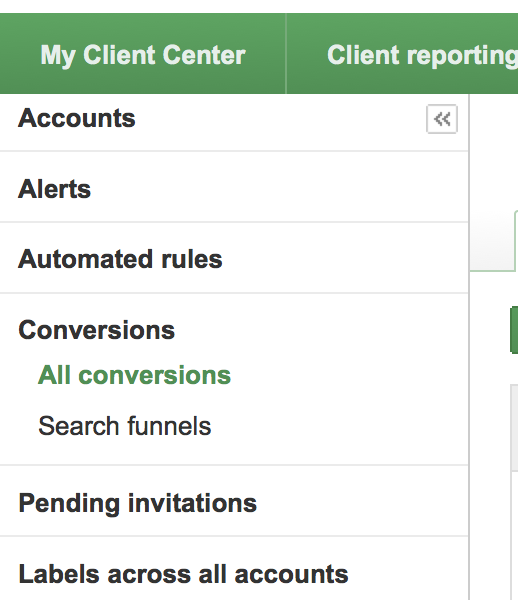Since the release of Google Tag Manager, we have continued to confirm Google’s suspicions that yes we do like simplification of processes. The newest feature available is the Cross-Account Conversion Tracking option.
Cross-conversion tracking is the placement of one snippet of conversion code across multiple accounts in your MCC. You create a conversion that spans all of these accounts and are then able to optimize various parts of your accounts based on the MCC-wide data you accumulate.
Easier: Much like the effect of Google Tag Manager, cross-conversion tracking requires fewer codes to be placed across your accounts. For those of us not fluent in javaspeak, this is a huge benefit as we have less code to sift through when updating our tracking methods.
Speed: Minimizing the HTML on your site also keeps the load time lower, which directly affects your user’s experience.
Comprehensive reporting: Similarly, reporting is simplified, as data can be pulled from the MCC level instead of account by account by account. This allows you to get to the point of your analysis with fewer steps in aggregating data, and gives you better snapshots of the account.
Accuracy: With reduced code on your sites, this also reduces the likelihood of accidentally double-counting conversions.
Control: Once you set up a cross-account conversion, you cannot make changes to it if signed into the client account. Instead, you will need to be signed into the MCC to alter these settings. Similarly, if you’re looking at reports from the account-level, you’ll see account- specific data. If you’re at the MCC level, you’ll be able to run reports across all accounts.
Data: When creating cross-account conversion tracking, you will want to keep both conversion tracking tags (account-specific and cross-account) running simultaneously for 30 days or so, to ensure you don’t miss any traffic. After 30 days, you should be good to take the original down. If you’re importing data from Analytics, you’ll still be able to do this for individual accounts. For account-specific conversions, you can still access previous data in AdWords.
Automated settings: If you’re using Conversion Optimizer, rest easy. Whether you are tracking account-wide or cross-account conversions, optimizations will still be made on the campaign level for either.
Super easy. Sign into your MCC. Create a conversion. Place that conversion tracking code on your conversion page(s) as usual.
Turning Data into Insights
By using Cross-Account Search Funnels, you can begin to piece together the user behavior that leads (or fails to lead) to conversions. Three reports that can provide insight to account-wide behavior are:
- Overview report: Take a look at the user behavior across your major metrics.
- Top Conversion Paths report: The benefit of this tool is that you can construct a report across accounts that lets you see the combination of keywords that lead your users to convert.
- Assisted Conversions report*: Here you can examine the value you’re assigning your keywords, thus evaluating your upper funnel keywords across multiple accounts through a single report.
*This report saves time and energy! If you’re looking for user behavior trends when it comes to keywords that are consistent across accounts, this is a great place to start!
What kind of client is ideal for this setup?
There are countless scenarios for which cross-account conversion tracking could be useful. Here are a few:
– Cross-account conversion tracking is especially appealing for lead generation clients who want users to convert through a contact form or sign up.
– Budget is segmented between various client accounts that all point toward a final lead goal.
- If you have different sites to better cater to location-specific users, such as DeepFry Donna’s Frying School enrollment forms for her campuses in Baton Rouge, Mobile, and Athens.
- If you split your PPC clients by network (Display vs Search) to better control your budget, ads, targeting, etc.
– If you have client accounts dedicated to specific product lines but with similar or equal conversions.
- A client who runs a booking agency for Civil War re-enactors but (as regional vernacular dictates) divides the services into two version: the Civil WarMen as one client and the War Between The States Soldiers as another. While this is the same live performance piece, the client is using two very distinct approaches between the two accounts, thus the division.
– This format is also a great tool for agencies with thousands of small accounts that must be built out using a platform and API. Using these cross-account conversion codes can save agencies from having to create new ACT codes for each new client.
More to come:
Google also suggests that this is not the end for conversion updates! To what are they alluding when they assure us that there are “more conversion features coming soon?” Keep your eyes out for more PPC Hero News Responses with details!







